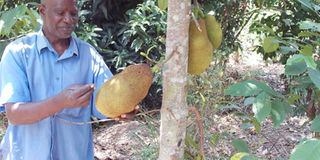Prime
He grows fruit trees for food security and to conserve the environment

Ssentongo examines Jackfruits on his farm. PHOTO BY MICHAEL J. SSALI.
What you need to know:
Until 1992, Ssentongo, who trained as an accountant at the then Uganda College of Commerce Nakawa, lived in Kampala and worked in various government departments
John Ssentongo of Lukindu Village in Kisekka Sub-county, Lwengo District, loves fruits and believes they are the solution to his community’s food shortage problem.
“When I set out to become a farmer I chose to grow mangoes, jackfruit, avocados, pawpaw and other fruit trees besides bananas, sweet potatoes and other food crops,” he told Seeds of Gold.
“Most people wondered why I was more inclined towards fruit tree farming. They preferred the common food and cash crops, hardly paying any attention to fruit trees.
But today, I notice that food crops are attacked by pests and diseases and there is little left for such farmers to depend on for food and income.”
From city to village
Until 1992, Ssentongo, who trained as an accountant at the then Uganda College of Commerce Nakawa, lived in Kampala and worked in various government departments.
“After close to 15 years of government service, I grew tired of city life and decided to return to my birth place, where I resolved to spend the rest of my life growing my own food and taking better care of my family.”
Upon arrival in Lukindu village, Ssentongo settled on the piece of land where his ageing parents lived.
He purchased five more acres on which he planted the fruit trees that are now his main source of income.
“Most of my customers come from the nearby Kiwangala Trading Centre but I also get many more from Mbiriizi Town on the Masaka-Mbarara highway.
However, much as I value the money earned from the sale of the fruits, I actually enjoy donating fruits to friends.”
He wants everyone to get involved in planting fruit trees.
“When I give them the fruits as gifts I always tell them to express their gratitude by planting the seeds of the fruits that I give them in their own gardens.”
Ssentongo is also pleased with the government’s decision to include fruit tree growing in its Operation Wealth Creation (OWC) project.
He says: “It is not just about wealth creation. Such trees keep Uganda green. It is a form of climate change mitigation. Trees attract rain and they provide fresh air for everyone to breathe.”
Centre of attraction

Recently, he benefitted from the OWC when he received 100 orange seedlings and as many mango seedlings, which he planted to expand his business.
He does not grow trees for just their fruits but enjoys being under tree shades. Whenever he holds any social functions at his home, he does not need to hire tents for people to sit under.
His farm has turned out to be a centre of attraction to environment conservationists and holiday makers.
As a result, he is now focussing on efforts to make it an eco-tourism site.
“I have had a few visitors from Europe and elsewhere. All of them are quite supportive of the idea.”
His two houses are lit by solar electricity but he has a plan to extend solar-powered electric lights to cover the fruit tree farm and to erect permanent seats there to make it easier for night-time activities.
He heads a community-based organisation called Sustainable Living Foundation (SLF) whose members are fellow fruit tree farmers.
They meet regularly in his compound where an iron roof shade has been erected for the purpose, just in case it drizzles, otherwise there is no shortage of shade given the abundance of trees at the place.
He explains the idea behind the group meetings: “We discuss the challenges facing our campaign to plant more fruit trees by farmers in our community.
Fruits are a healthy food and every household should be actively involved in their production. The future generation must pay sufficient attention to trees, especially indigenous fruit trees and food crops.”
His home is also a training centre where NGOs and agriculture extension workers meet local farmers to pass on new knowledge.
Another feature on the farm is a Slow Food community garden, which serves as a standard model for everyone in the village to learn about the rich local crop biodiversity and soil-friendly farming practices.
Good and organic
Slow Food is an international anti-hunger organisation whose members advocate food sovereignty, protection of biodiversity, and production of good, clean food.
Under their slogan “Good food, good farming”, local community members get together and plant treasured traditional food crops that are at the risk of extinction.
In addition to that they promote the selection, saving production and multiplication of local seeds which they share among themselves with a view to preserve traditional food crops in the community.
Time and again, local Slow Food member households gather at Ssentongo’s home to enjoy the garden’s harvest by cooking the food and eating it together with other members of the same community.
A few years ago, he was among few selected farmers from Uganda that attended an international Slow Food exhibition in Turin, Italy, known as the Terra Madre. He has fond memories of the international event.
Apart from growing fruit trees, Ssentongo keeps some livestock; this includes goats and pigs.
He advocates the use of organic manure by smallholder farmers, which nourishes the soil and improves yields.
He trains other farmers in the preparation of organic liquid manure, compost manure and other types of organic manure.
Keep green is the message
On the trunk of one of the trees in the compound of his residence hangs a metallic placard with the words: “Keep Uganda Green. Plant more trees.”
The green colour is actually reflected on almost everything in the compound including his two houses, one of which serves as his office.




